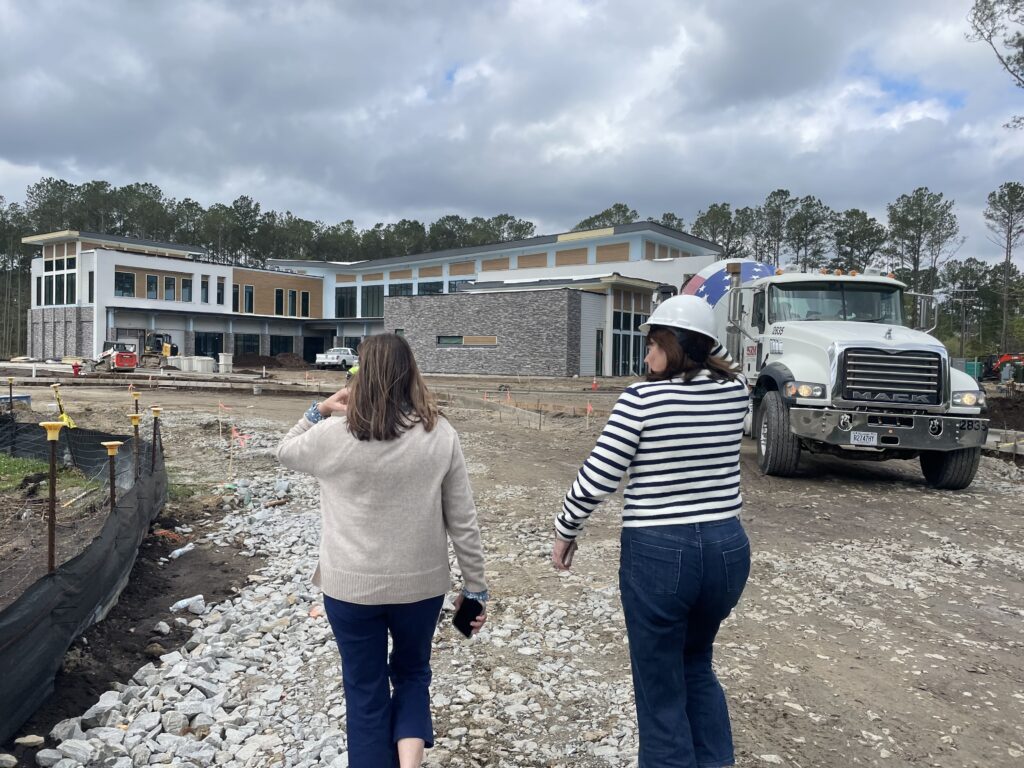'Caring for the caregivers'
Early Bird readers, hello again. Newcomers, welcome! If you were forwarded this email, you can sign up here to receive it every two weeks, and join our conversation on issues facing North Carolina’s young children and those who support them. If you’re already a subscriber, please help us reach more people by sharing this with your friends and co-workers interested in early childhood education.

Since our last edition, I’ve been on the road. I had the pleasure of touring Onslow One Place’s new facility, which they’re calling “Hope,” opening this fall. The new location will expand all kinds of services for children and families, from trauma-informed training to mental health care for youth. Its Children’s Advocacy Center will double its capacity, and we’re releasing a story on the difference the model has made this week.
I’m now writing this edition from Wilkesboro after spending the day at PlayWorks, a child care program that just moved into a wing of Wilkesboro United Methodist Church after nearly closing its doors due to an unexpected terminated lease. I’m excited to bring you all the story of how the church and larger community rallied to save a 12-year old program and expand its reach.
In both settings, something that I heard at the State of the Child Summit, hosted by NC Child and the NC Institute of Medicine in Raleigh on April 15, has returned to the front of my mind. During the keynote, Cynthia Osborne, from the national Prenatal-to-3 Policy Impact Center at Vanderbilt University, outlined policies that research has linked to positive outcomes for children in the first three years of life. She said those policies have a through line:
“All the policies and programs that are effective really focus on caring for the caregivers so that they can do the job of caring for their children,” Osborne said.
In Onslow and Wilkes counties, I spent time with people who pour their energy into caregivers, helping them get the training, funding, and respect they need in order to show up and be well for the children they serve.
Meanwhile, state senators released their budget proposal during a session in which lawmakers are discussing what policy approaches can best support child care access and affordability. Scroll below to see what’s in the proposal for child care. The House will release its plan in the coming weeks, and then the two chambers, both with Republican majorities, will work toward a compromise budget for the next two years. Go here for a breakdown of the education components in Democratic Gov. Josh Stein’s proposal.
No matter what happens in Raleigh, I’m always uplifted by the people on the ground who are making the best of limited resources and showing up day in an day out for their neighbors. Thank you for the work you do, and thank you for reading.
More from EdNC on early childhood
Senate budget updates child care subsidy rates, lacks subsidy floor
The state Senate’s budget proposal, released Monday night, would allocate funding for North Carolina’s child care subsidy program, which helps low-income working families afford care. It also would direct federal funding to create a pilot aimed at expanding child care...Gov. Stein, cross-sector child advocates check in on the 'State of the Child' at second annual summit
This article discusses mental health and suicide. If you or someone you know needs help, reach out to the National Suicide and Crisis Lifeline by calling 988. Gov. Josh Stein addressed professionals from child care, health care, education, foster care,...Perspective | We want North Carolina to be first in children
NC Child and the North Carolina Institute of Medicine cohosted the second annual State of the Child Summit on April 15th. The summit featured remarks by Gov. Josh Stein, Lt. Gov. Rachel Hunt, Sen. Thom Tillis via video, NCDHHS Secretary...The big picture for little kids
Legislative Updates
The Senate budget proposal:
- Adds an additional $80 million each year ($35 million in state funding and $45 million in federal funding) to the state’s child care subsidy program.
- This updates the rates participating child care programs receive from those in a 2021 study to those in a 2023 study. In some cases, that means programs will receive more per child. In other cases, those rates will remain the same as what they currently get.
- Allocates $2 million in recurring funds for 2025-26 and $2.5 million in recurring funds for 2026-27 to the North Carolina Partnership for Children to implement Dolly Parton’s Imagination Library.
- Directs $6 million in one-time funding for a pilot to increase child care capacity in Alamance, Harnett, and Johnston counties.
- It directs each council of governments to select a third-party vendor to coach new family child care providers through setting up programs on a six-month timeline, plus creating a mentorship program to retain them, among other things.
- Lacks a subsidy floor, a policy that is backed by the state Division of Child Development and Early Education and is the main policy priority of several early childhood advocates. A floor would cost about $220 million and would help level the playing field for child care programs participating in the subsidy program across counties. The amounts they receive vary widely based on the county they’re in.
News & Research
-
Early Childhood Education in the Fifth District: The Challenges and the Opportunities - From Federal Reserve Bank of Richmond
-
Kids on Campus Project Releases First Annual Progress Report - From National Head Start Association
-
How Early Childhood Education Programs Survive or Close - From Education Writers Association
-
With Head Start in jeopardy, Trump administration threatens child care for 800,000 kids - From Los Angeles Times
-
States try to tackle child care shortages — by lowering standards - From The Hechinger Report
-
Pentagon Hiring Freeze Hits Army, Space Force Base Day Care Centers in Colorado - From Military.com
-
In tough budget year, raises for Colorado child care workers win continued support from lawmakers - From Chalkbeat Colorado
Taking flight! Opportunities to spread your wings
Advocacy circles for early childhood educators - From The North Carolina Association for the Education of Young Children
May 13, noon to 1 p.m., and June 10, noon to 1 p.m.
From the organizer:
“The NCAEYC Advocacy Circle is a safe space to team up with other early education professionals and discuss localized ways to help our profession thrive.”
Early childhood and housing training - From Child Trends & the Alliance for Early Success
This spring, three free trainings from Sara Shaw, Marsha Basloe, and Ashley Hirilall will offer guidance to state advocates interested in better collaboration between early care and education and housing systems to support young children and families experiencing homelessness. Click the link above to express interest and input your availability.
From the organizer:
“The three-part series will help participants answer the following questions:
Part 1: Why is it important to focus on cross-sector collaboration between early childhood and housing systems? How do you form cross-sector partnerships?
Part 2: How do you engage in cross-sector collaboration?
Part 3: How do you maintain and leverage these relationships to support children and families?”
Trainings to identify signs of child abuse - From Positive Childhood Alliance North Carolina
April is Child Abuse Prevention Month. Positive Childhood Alliance has free trainings to recognize and respond to suspicions of child maltreatment and learn about the importance of prevention. All adults in North Carolina are mandated by law to report suspected child abuse or neglect.


